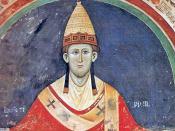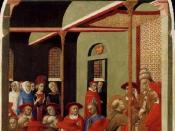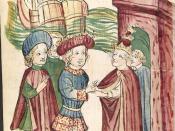Who was greater: the Pope or the Emperor/Kings? Ever since the legalization of Christianity in 313, popes and emperors have been involved in numerous disputes about who was the head of Christian society. Emperors claimed authority, making reference to precedence such as Constantine and the Council of Nicea in 325. The papacy on the other hand, argued papal primacy with such ideas as the Petrime theory, the history of orthodoxy, and the fact that the Pope controlled the old Roman capital.
The Concordat of Worms of 1122 CE brought an end to the investiture controversy. However, some historians argue that in the centuries that followed, the papacy overstepped its jurisdiction when it began to exert control over the political sphere as well. Pope Innocent III coming after a long line of popes of who had exerted such control is one that is most intensely attacked. Did he overstep the boundaries of the papacy and interfere in the political affairs or was he merely acting in a sphere in which he had all the right to do so? Innocent did not waste too many opportunities to explain how his appearance in temporal affairs was justified.
In fact, he provided justification in almost all of his letters, decrees, and policies. By examining a few of the many examples, it is apparent that Pope Innocent III mostly used the rhetoric of god to justify his place in political affairs. Although, he may at times have used other persuasive strategies such as logic, precedent, and historical events, his strongest element of justification was that his actions were in fact the will of god.
In a letter to the prefect of Acerbius and the nobles of Tuscany, Innocent III insisted that his power was greater than the power of the Kings. He clarified this by...


